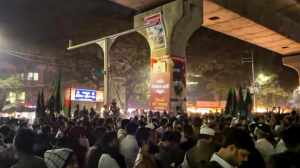A day after External Affairs Minister Sushma Swaraj told Parliament that a solution to the Doklam standoff lay in dialogue and not war, Chinese Consul General in Kolkata, Ma Zhanwu, said that “shared interests’’ between the two countries “far outweigh any differences’’ and India and China need to resolve the issue through “rational, objective and constructive means.”
Ma’s remarks Friday is a departure from the heated rhetoric of the Chinese over seven weeks of the ongoing standoff between Indian and Chinese troops at the trijunction with Bhutan.

“In relationships between nations, there are always differences. It is like belonging to a family with many brothers and sisters. There can be differences between siblings and even parents. If there are such differences between two brothers, that does not mean that they cannot get along. You don’t stop dealing with that brother, with whom you have differences, on other issues,’’ Ma said.
“There are differences and problems between India and China. But the shared interests between the two nations far outweigh these differences. If a rational solution cannot be found immediately, then constructive cooperation needs to continue till the time a solution is found. China and India should continue with friendly exchanges and mutually beneficial cooperation,’’ the Consul General said.
While reiterating that Doklam is “Chinese territory”, Ma said despite the “differences’’, there was need for both nations to focus on and continue economic cooperation. In Rajya Sabha Thursday, Sushma Swaraj underlined that China had been contributing to India’s economic growth and had huge stakes in the country. On Friday, Ma said Chinese businessmen and companies were interested in not only continuing but increasing investment in India, especially in the eastern sector — West Bengal and the North-East states.
Despite the ongoing tension, the Chinese Consulate in Kolkata, in cooperation with the Indian research institute, Asia in Global Affairs, and the Chinese think-tank Research Institute for the Indian Oceans Economics (RIIO), will be holding a seminar regarding exchanges and cooperation between China and eastern India.
The seminar will specifically look at four sectors — connectivity and integration, BRI (Belt and Road Initiative) and its global possibilities, the potential of synergy between China and India and BCIM (Bangladesh-China-India-Myanmar) and sub-regional cooperation. Over a dozen academics from Beijing, Shanghai, Kunming, Delhi and Kolkata will be attending the seminar.
Story continues below this ad
In New Delhi Friday, the Ministry of External Affairs said, “Our objective is to achieve peace and tranquility, and it will be achieved through diplomacy.” Asked about China’s statement that India has reduced the number of its troops from 400 to 40 by the end of July in Doklam area, Gopal Baglay, spokesperson for the MEA, did not elaborate, saying “these are operational matters”.
He said India continues to engage with China diplomatically and has been coordinating with Bhutan to find a mutually-acceptable solution to the Doklam standoff. Asked about specifics of the diplomatic channels, he said, “I am not prepared to go into the domain of diplomatic interactions.”
Associated Press adds from Beijing: On Friday, China Central Television broadcast video it said showed an army unit in an unidentified part of Tibet carrying out live-fire firing exercises in the past few days. A commander sitting in a vehicle shouted “3, 2, 1, fire!’’ into two telephones and a missile was launched into the sky. Troops were shown loading and firing other missiles, some of which landed in fiery explosions.
The report, which was also carried in other state media, didn’t mention the dispute with India, and said the unit has been training for three months. It appeared to be an attempt to increase pressure on India, however, along with strongly worded statements this week from China’s foreign and defense ministries, as well as in state media.
Story continues below this ad
“China has made it clear that there is no room for negotiation and the only solution is the unconditional and immediate withdrawal of Indian troops from the region,’’ said a commentary Friday by the official Xinhua News Agency. “If China backs down now, India may be emboldened to make more trouble in the future,’’ it added.
Chinese Defense Ministry spokesman Ren Guoqiang said Thursday that while Chinese armed forces had shown “utmost goodwill’’ and a “high level of restraint’’ in the face of the Indian troops, “restraint has its limits’’. “No country should underestimate the Chinese forces’ confidence and capability to safeguard peace and their resolve and willpower to defend national sovereignty, security and development interests,’’ Ren said in a statement.

 Our objective is to achieve peace and tranquility, will be achieved through diplomacy, says MEA. (Source: Express Photo/Subham Dutta)
Our objective is to achieve peace and tranquility, will be achieved through diplomacy, says MEA. (Source: Express Photo/Subham Dutta)






